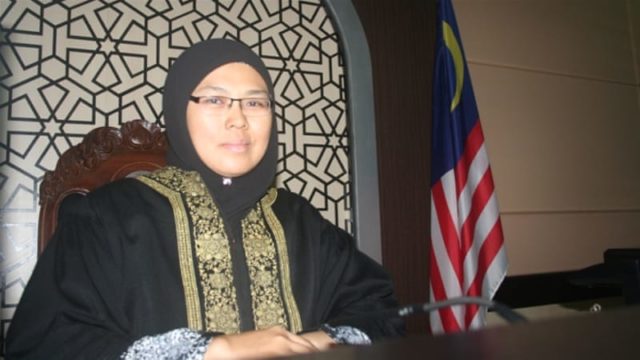Malaysia practices a moderate form of Islam but the usage of Sharia is rising in Malaysia and hundreds of Muslims use it to settle ethical and household issues.
But Malaysia’s first female Sharia High Court judge Nenney Shushaidah wants to take the opportunity to protect Muslim women.
Islamic Law, also called the Sharia Law, is usually associated by critics with harsh punishments.

How is she trying to protect Muslim women?
High Court judge Nenney Shushaidah presides over five trials a day and can hear up to 80 cases a week.
She passes judgment on everything from financial cases to those involving the Sharia concept of Khalwat (excessive closeness between persons of the opposite sex).
Judge Nenney Shushaidah’s expertise lies in cases of child custody and polygamy – the Muslim concept of allowing men to marry up to four wives, which is legal in Malaysia.
She says there are various factors she considers in a case, for example, allowing a polygamous union.
“Every case is complex and different. You can’t generalize Islamic law and say it supports men and treats women badly. I want to correct that misconception,” she says.
She says that there are cases where some wives are supportive of the idea of polygamy. For example, there was a case which involved a seriously ill woman who could no longer bear children.
“She loved her husband and wanted me to grant him permission to marry a second wife. So I did,” she says.
The High Court Judge says that a man has to have strong reasons for wanting another marriage. She says that the man must show that he can look after the welfare of his first wife as well as the second wife. He must not neglect the needs of anyone.

What is Sharia?
Sharia Law or Islamic Law is a religious law forming part of the Islamic tradition and derived from the religious principles of Islam, particularly the Quran and the Hadith.
The Law has been misused where right’s activists were outraged by the recent caning of two Malaysian women convicted of attempting to have lesbian sex.
She wouldn’t address the case and says, ”Caning under Sharia law serves to educate offenders so as not to repeat the act again.”
The law doesn’t always work in favour of men. It exists to protect women’s rights and safeguards their livelihoods.
Sisters in Islam (a women’s group) highlighted a severe shortage of female representation in the courts and a strong sense of patriarchy in the overall system.
“The Sharia legal context in Malaysia not only selectively discriminates against women, it vilifies them as the cause of social immoralities,” said spokeswoman Majidah Hashim.
The BBC 100 women list includes leaders, trailblazers and everyday heroes from more than 60 countries. She is the only Malaysian among 13 women from Asia named for their contributions and fighting spirit.
Image Credits: Google Images
Sources: Wikipedia, BBC, Herald Malaysia
Find the Blogger at: @NivedytaK
Also Recommended:































